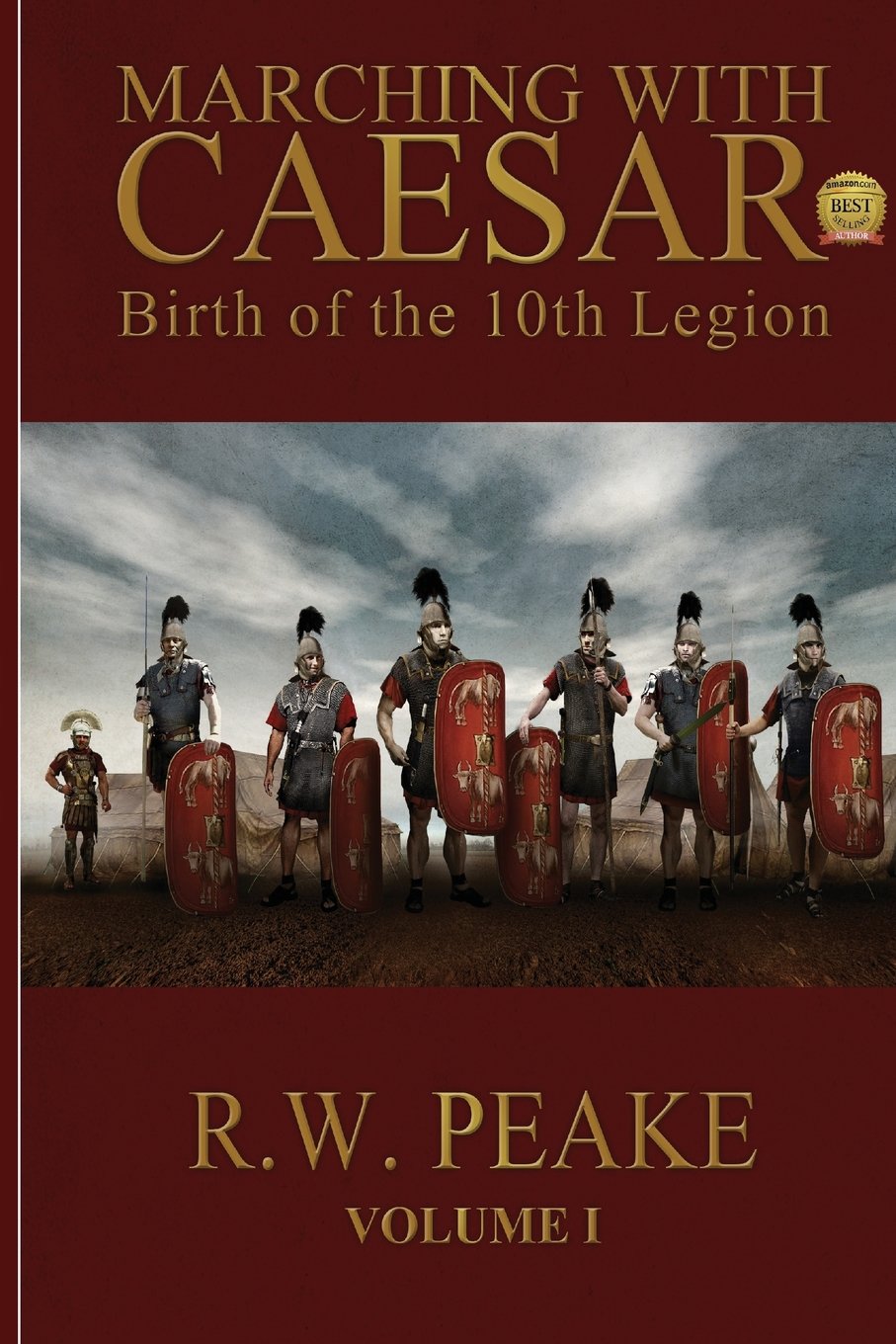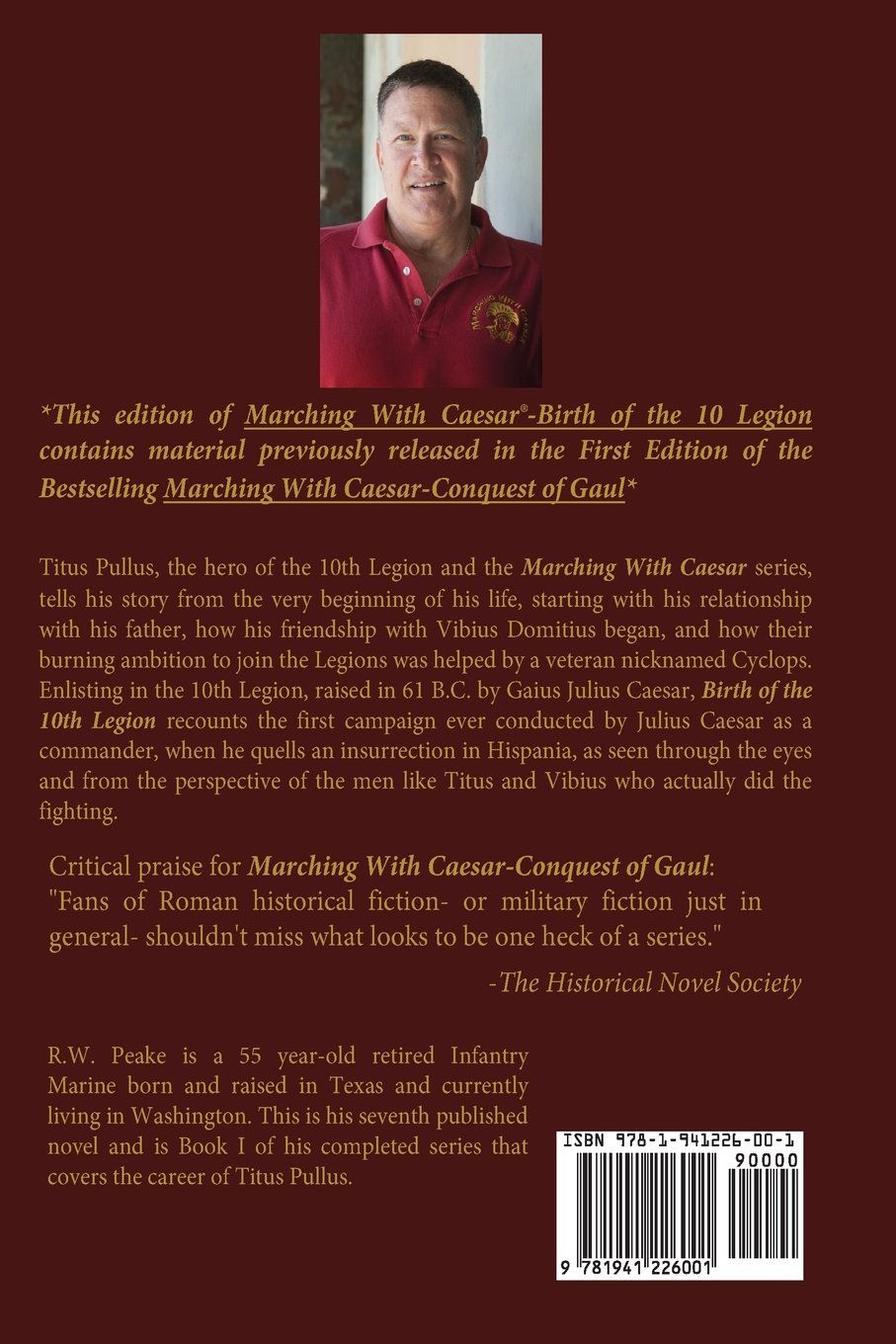Customer Services
Customer Support

Desert Online General Trading LLC
Warehouse # 7, 4th Street, Umm Ramool, Dubai, 30183, Dubai
Copyright © 2025 Desertcart Holdings Limited



Full description not available
W**N
Another "Best in Class" from a master story teller of a fascinating period.
Peake presents all the necessary elements: the feel and "smell" of the individual Legionaries from squad to command level, the campaign strategy and tactics of the best battle-scenes to be found anywhere, and the details of how these justly famous and dominant warriors actually fought. The key, based on endless practice and harsh disciplne, was to fight as a unit be it a Century of 80 under a Centurion (and 3 other officers), a Cohort of about 500 under a Pilus Prior (6 Centuries plus 24 officers)or a full Legion of 10 cohorts; the First Cohort was composed of elite legionaries and Centurions, and was nearly double-sized. It was commanded by the Primus Pilus ("First Spear") of the Legion, the highest rank which a commoner could attain. The essential tactic was to present a solid wall of steel-edged shields and stab between or around them with the relatively short gladius sword while pressed as tightly as possible and moving forward against the enemy who, though often brave and fierce, fought as individuals and with much longer and heavier blades. Because of the constant pressure by the legionaries' shield wall, augmented by a second line pressing with their curved shields into the backs of the first line, the "barbarian" couldn't effectively use his big blade or axe.Peake deftly weaves all this together smoothly in a highly enjoyable, exciting story of the formation and first campaign of this famous Legion X, its commander Julius Caesar and the introduction of the fabulous Titus Pullus, the central character of the other seven books in this "Marching" series, of which this is a prequel. Even to those who have read some or all of the other books, this is a comfortable, strongly-recommended stand-alone.Some of the book covers familiar ground with more interesting detail regarding the big, strong farm boy and his close friend who desperately want to become legionaries. They (and we) receive some invaluable tutelage particularly as to weapons usage from a neighbor, a retired well-known and highly regared Centurion.This book is set in Hispania where the Xth is first formed (from Roman citizens) and fights against rebelious tribes. This is the history of much of the legions' use under Caesar and his nephew and designated heir Octavian, later "Augustus" the first Emperor of Rome. This great series follows Pullus through all that period in Gaul, Britannica, Germania and elsewhere, including Egypt, and his rise from recruit to Camp Prefect, a position created in a reorganization by Augustus, to maximize the formal authority of the proven warriors from the Centuriate in the actual direction of the legions, previously by the nobiliity-only Tribunes and Legates. The Prefect would now formally outrank the Tribunes and become the effective field commander, usually of an army of two or more legions. A Legate commanded each legion (about 5500 men plus auxilliaries of non-citizen, Provincial troops) and, generally, two or more legions were under a General.Previously, the highest-ranking commoner-officer in each legion was the Primus Pilus (or "First Spear") of each legion who technically was under the Tribunes but, in fact, was treated by the successful Legates and Generals as their number two. Like all of the Centuriate, these men actually fought the battles and suffered the high casualty rates. Upon retirement, the Primus Pilus was entitled to move up to the considerably higher status (including wearing the narrow purple stripe) of the Equestrian class which was an important goal to Titus for himself and his family, and an underlying element in his various political and personal crises throughout the series. Titus Pullus took crap from no one; an outstanding highly-decorated characteristic in battle, but in some of the "interpersonal tensions" he was fortunate to have some wise friends to temper and otherwise help keep him focused on the longer-term goals. These too are interesting, often humorous, elements of the saga.The only negative is that I am halfway through "The Final Campaign" and fear that it might be so.
W**R
The beginning of the legend!
The new version of Birth of the 10th legion & the first big guy. Not much new material about the big guy. Quite a lot of info on how a new legion gets born & blooded. Go Big Guy. Wichita Lawyer
M**E
Love this hard-bitten old centurion!
This expanded version of Peake's original introduction to the tale of Titus Pullus sounds, as do his earlier books, like the account we have of Caesar's last campaign, in Spain in 45 BCE, which has been described as "the work of a hard-bitten old centurion who fought better than he wrote." Which is, of course, precisely the author's goal and the charm of his work. If you are new to these stories, you should be aware that the author has two things going for him. One is the believability of his central character, Titus Pullus, whose narrative will soon have you convinced that you really are reading the recollections of an old soldier near the end of his life, and is here recalling when he was a naive kid from Spain, who eagerly joined and then struggled to adapt to life in a professional army. The other thing Peake has going for him is the quality of his backstory, which is easily on a par with those of Sidebottom and McCullough. He has done his homework extremely well, and also engaged in a great deal of personal research. It makes a difference: even a reader who's very familiar with Roman history, society, and military practice will find nothing to distract him or her from what's really important, i.e., the story. Peake's combination of his research with his own military experience has produced a narrative from "a grunt's-eye view," which is probably as close as anyone will ever come to re-creating the life of a legionary soldier. If you're already familiar with these books, the great value of this one is to provide a more leisurely and engaging introduction to Pullus and his comrades.Only one caveat. Readers new to Peake and old hands should both know that the framework of this part of his story, unlike the rest of his novels, is based on speculation, not history. To make his longer narrative work, he has had to set the enlistment and first campaign of the 10th Legion in Spain in 61 BCE, under the then-propraetor of the Spanish provinces, C. Julius Caesar. Likewise, at the end of the book, he's had to have the 10th and three other legions, which he also placed in Spain that year (the 7th, 8th, and 9th), march off to and encamp in either southern France or northeastern Italy. No historical evidence exists for any of this. The history of those four legions begins with Caesar's own writings, which inform us that there were four legions in his provinces when he arrived there as proconsul in March, 58 BCE, and (later) that they were numbered Seven through Ten.Read and enjoy!
R**7
Fantastic!
I am halfway through this book and the writing is incredible. I found myself really engaged with the characters. If I have any quarrels with the writing, it is with the use of whistles in the Legion, and the use of the title, Sergeant, which is Old French (sergant).Decanus was the proper title/rank of the leader of a contubernium, or 10-man squad.Whistles were never used in the legions to move men during combat. Even the Pilus Prior in the book states that battles are incredibly loud affairs, a whistle could not be heard. Standards and the transverse crests of the centurions' helmets were what kept formations together. No whistles were ever found in archaeological digs, nor was anything ever written about them. They would have been rather important items to have in battle, you'd think someone would have mentioned them. A popular TV series about Romans used whistles in the production, but it is also wrong.That said, still a great read!
S**D
good
Good but not great. Too much third person spoken with Titus speaking of his experiences and less of his interactions and conversational dialogue. In fact there was very little dialogue and almost all reminiscing of Titus Pullus’ adventures in the 10th Legion. Interesting but gets old fast.
B**N
Fabulous !
I have a new man in my life Titus Pullus! What drew me to this book is that it is one of a series. Having loved the Vespasian series from Robert Fabbri I wanted something similar , and boy have I found it! Nineteen books, great writing, great subject, I’m only on number three but I am enjoying them all, is Ancient Rome is your thing then these are for you!
R**A
An original new way
It is a good book full of details about life in the legion and an exciting count of the campaign
G**E
La legione preferita da Giulio Cesare
La storia del periodo di Giulio Cesare, straconosciuta da tutti, vista però con gli occhi di un ambizioso e Giovane legionario romano.
S**S
Great narrative
Thoroughly enjoy this vivid description of a legionaries life and the trials they faced. On to book 2 ! Enjoy
J**N
History from the Front Line
R.W. Peake's "Marching with Caesar: Birth of the 10th Legion" is a definitive work of historical fiction. Too often, historians focus their energies on the major figureheads. Too little is said about the rank & file. When reporting events 2,000 years ago there are few if any records of the common folk. R.W. Peake details Rome's most famous legion from a ranker's point of view.You will see why Roman legionaries had become the most respected fighting force of their era. He describes the composition of the century, the cohort and the legion. He details the equipment worn by the legionaries and their commanders. He shows the conditioning instilled at "boot camp." He describes the basic tactics and weapons uses, and why these gave Roman soldiers a decided advantage over the enemies they battled. This book comes with authentic maps and a brief glossary of Latin terms that were common used by the soldiers.The main character and narrator, Titus Pullus, is a new recruit to the 10th-legion. He is physically endowed with all the attributes of a heroic trooper. Through him the reader will experience what it's like to be on campaign. Though it's hard for 21st-century readers to comprehend brutal realities of face-to-face combat, the author does a good job of conveying the madness and psychological stresses. This book is not for the faint of heart. War in the classical era would make brutal prison uprisings seem like a pillow fights among pubescent girls.I recommend this book for anyone who seeks a better understanding of classical Roman customs. "Birth of the 10th Legion" is part of a series and should be read before the others, which include "Conquest of Gaul", "Civil War", "Anthony & Cleopatra parts I & II".
Trustpilot
1 month ago
3 weeks ago